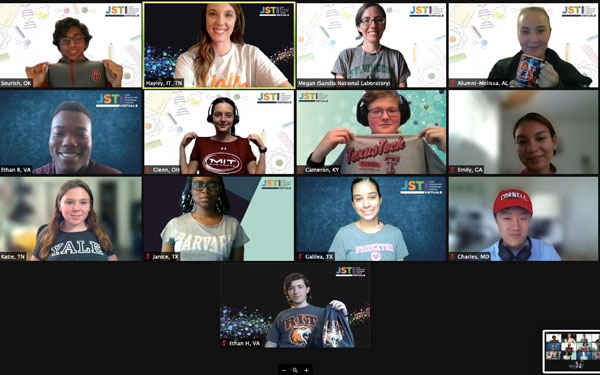
For two weeks in July, eight Sandians mentored high school students from across the country who participated in a virtual quantum information science program. Sandians Megan Ivory, Mohan Sarovar, Roger Ding, Lisa Hackett, Daniel Dominguez, Ashlyn Burch, Bethany Little, Will Kindel and Mekena Metcalf, from Lawrence Berkeley National Laboratory, volunteered their talent to the Joint Science and Technology Institute to inspire an interest in STEM careers among high schoolers.
Mentors assisted students with hands-on projects that were modeled after real-world quantum information problems and tools. Students spent the first week doing various exercises and lab experiments to learn the relevant background material necessary for understanding quantum computing. During the second week, students created and demonstrated circuits on IBM’s open access quantum computers. Researchers typically don’t gain this type of exposure to quantum information until late in undergraduate or graduate school, due to the common practice of requiring advanced mathematics and physics courses as a prerequisite. Mentor Megan Ivory hopes that exposing women and underrepresented students to quantum information as early as high school will help to improve representation in the field.
Students dedicated 49 hours to their projects, practicing research techniques, the scientific method and data collection. Mentors contributed their time, from one to 25 hours during the two-week period, and their expertise to support the students as they worked on their project. Mentors each gave an hour-long career talk to expose students to varied career paths and to share survival tips along the way. At the end of their project, students created both a poster and video presentation, which they presented to all JSTI Virtual participants.
“Our particular project, quantum computing and technology, is a topic that most students aren’t exposed to until late in their undergraduate or graduate studies due to the advanced mathematics and physics prerequisites,” Megan said. “We hope that by getting high schoolers excited about quantum computing will increase representation, bring in new ideas, and revolutionize the field in the future.”
The Joint Science and Technology Institute was launched in 2012 to teach students about STEM and encourage future careers in STEM fields. The program is sponsored by the Defense Threat Reduction Agency and targets students who can benefit from additional exposure to STEM topics. The program is available to all but encourages participation from underrepresented students and those with ties to the military.